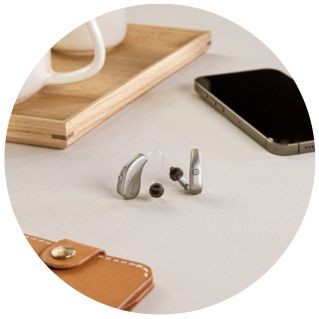Why are hearing aids so expensive?
Why are some hearing aids more expensive than others?
Latest Hearing Aid UK Update: 02/02/2026
Overview
If you're reading this page, you've probably just experienced sticker shock. Perhaps you've seen hearing aid prices online and thought, "That can't be right" or "I simply can't afford that." These reactions are completely normal, and we hear them every single day.
Looking into the reasons why hearing aids are so expensive? Hearing aids are expensive due to the advanced technology they incorporate, including miniaturised electronics, Bluetooth connectivity, and rechargeable batteries.
Extensive research, development, and customisation for individual needs also contribute to high costs. Professional services for fitting, programming, and ongoing support add to the overall price.
But here's what many people don't realise: the published price often isn't the full story. With some providers, you'll face additional charges for aftercare, adjustments, and ongoing support. With us, everything is included upfront - no hidden fees appearing months down the line.
So, why are digital hearing aids so expensive?
When embarking on researching hearing aids, a lot of people often wonder, "Why are modern hearing aids so expensive?", "Why are Oticon hearing aids so expensive?", "Why are Phonak hearing aids so expensive?" or "Why are private hearing aids so expensive?"
These are, without doubt, a few of the most common questions we get asked by our customers. As most people with hearing loss need two hearing aids, the price tag eventually becomes a huge factor in people deciding to get help or not.
The worry about cost stops thousands of people from addressing their hearing loss, which means the isolation, frustration, and health impacts continue while they delay seeking help.
Digital hearing aids are an important investment for your health and quality of life. They are something that you wear practically all day, every day, so it's important to remember that you are investing in far more than just the devices themselves.
You're investing in better relationships, reduced social isolation, improved cognitive function, and frankly, a better quality of life. The research linking untreated hearing loss to depression and dementia is rather compelling.
UK statistics show that 6.7 million people would benefit from hearing aids; however, only 2 million people wear them. If we take a look at the reasoning, price, appearance, and stigma are up there when considering hearing aids.
Are expensive hearing aids worth it?
So, why are hearing aids so costly? When it comes down to cost, there's a lot to consider when researching hearing aids, as well as making sure that the money and time spent are well worth it. At the end of the day, everyone has their own idea of what 'expensive' looks like.
What we can tell you is what you should expect for your money - and what you shouldn't accept paying extra for. Hearing aid prices are dictated by things such as the level of amplification needed, hearing aid brand, lifestyle choice, dexterity, technology and Bluetooth connectivity.
Our prices include everything: comprehensive hearing tests, professional fitting and programming, all adjustments and fine-tuning, and lifetime aftercare for as long as you own the hearing aids.
Plus free home visits if that's easier for you. Many providers charge separately for these services - those "extra" fees can add thousands to your total cost over time.
How do hearing aid brands select their price tags?
Hearing aid brands set their prices based on various criteria, but to simplify things, it is mainly because of the degree of design and research needed. Over time, hearing aids have become more advanced and modernised due to research and technical design.
How the brain manages sound, how the ear works and how we can support the brain and deliver better sound information are a few key research areas. Oticon's BrainHearing technology breakthrough is one great example of this.
This research genuinely improves outcomes - we're not talking about marketing fluff, but real improvements in speech understanding, listening effort reduction, and sound quality.

The truth about hearing aid costs
Why are good hearing aids so expensive?
Behind the scenes
What makes hearing aids so expensive? The research and development costs for hearing aids are a lot higher than in many similar sectors. This is because hearing aid chips are not a reused technology that is also in other devices.
They are custom-made by the hearing aid manufacturer, specifically for that line of hearing aids. As well as the hardware development costs, there is research to refine the hearing aid features, which are software-based.
Such development is important, as hearing aid manufacturers need to be on top of their game to remain competitive and offer better solutions to make you hear better. Hearing aid price is reflective of this, so that it covers the cost of research, staff, and they also want to make a profit.
Value for money
The good news is that due to advances in technology, you get more for your money now than you would have done a few years ago, and most premium hearing devices back then are now considered to be relatively basic. Therefore, you may well be able to spend a lot less than you did on your previous pair of hearing aids but still get better performance.
Today's mid-range hearing aids often outperform premium devices from just five years ago - which means you can get excellent performance without necessarily buying the most expensive option.
Hearing aid manufacturers know that price often influences choice, and this is the reason why they are dedicated to offering various technical specifications to suit different budgets, price points and therefore accessibility. Introductory performance levels will include fewer and less advanced features, and the premium specifications will have all the top features.
It all depends on what you want. And crucially, what you actually need - which isn't always the most expensive option.
While hearing aids can be pricey, the ongoing support and aftercare you will receive from your local audiologist go in some way to make the amount more reasonable. The gift of communication, health benefits and quality of life that investing in and wearing hearing aids bring surely outweighs the cost.
This is where our included lifetime aftercare becomes tremendously valuable - you're not just buying devices, you're buying decades of professional support at no additional cost.

What is the most expensive hearing aid?
How expensive are hearing aids?
Our hearing aid price tags
To give you a rough idea, the most expensive hearing aid is £1895 (per aid), and the most expensive hearing aids are £3695 (for a pair). However, this would be even more expensive if you decided not to purchase hearing aids from us, as you may find yourself paying up to 40% more.
We're typically 30-40% cheaper than high street chains for the exact same hearing aids - not similar models, the actual same devices. Just for comparison's sake, hearing aids generally start from around £445 per aid and £795 a pair.
Unlike many competitors, we publish our prices openly online. We think you deserve to know what things cost before you travel to an appointment or feel pressured to commit. This transparency is rather unusual in our industry - but we think it should be standard.
Are expensive hearing aids better?
Regarding more expensive hearing aids being better, the premium devices provide you with top technology. They include more hearing solution features and better programs to personalise your experience. The more features you want, the more expensive the hearing aids will be.
That being said, cheaper hearing aids are still very powerful and effective. You just need to ask yourself what you want from your aids and what your audiologist thinks your hearing loss needs.
Because we're truly independent - not affiliated with any manufacturer - we have no incentive to push you toward expensive options. We'd genuinely rather you spent £1,000 on the right hearing aid than £3,000 on something overpowered for your needs.
Good, inexpensive hearing aids
What is the best inexpensive hearing aid? Hearing aids are costly, but in all honesty, they don't have to be. There are some great hearing aids out there from the top hearing aid manufacturers in the industry that are jam-packed with fantastic technology. Hearing aids that cater to all budgets, as well as simply help you hear better.
Are inexpensive hearing aids any good?
The cost of hearing aids is generally determined by two things: the type of hearing loss and your lifestyle. Generally speaking, there is no need to buy top-end hearing aids if your hearing requirements are quite simple. Cheaper hearing aids have fewer features and less finesse, but they are not lower-quality products.
If you spend most of your time in quiet environments, have straightforward hearing loss, and don't need sophisticated noise management, entry-level aids can work brilliantly - and cost substantially less.
Should I buy an inexpensive hearing aid?
Is buying a cheaper hearing aid the right thing to do for my hearing loss? Hearing Aid UK is a true advocate of finding the right solution for you and your hearing loss. This might not be the most expensive hearing aid, but you might want all the bells and whistles, and that's down to you and your preferences. In the end, you shouldn't pay more for what you need.
Like most things in life, it all depends on what you want from your hearing aids. How important connectivity is, your budget, the overall look of the hearing aid, if dexterity is limited, what feature set you require for your hearing loss, your lifestyle and much more.
This honest conversation about matching technology to actual needs is why our free home visits or clinic assessments are so valuable - we can assess your real-world requirements, not just sell you the most expensive option.

Hearing Aid Expense in the UK
Online Hearing Aids
Buying hearing aids online
In this section, when I talk about inexpensive hearing aids, I am referring to the online devices you can buy that need no hearing test and are pre-programmed. A quick fix, so to speak. These might do more damage than good, as finding the right hearing solution secures the success of your hearing future. This should always start with a professional hearing test undertaken by an audiologist.
A hearing healthcare professional who will advise, support, fit your devices, service them and give you the aftercare service you deserve. The "cheap" online option often ends up costing more when you factor in devices that don't work properly, wasted money on unsuitable aids, and delayed treatment while your hearing deteriorates further.
Cheap hearing aids
These cheap hearing aids are never going to be as beneficial as the hearing aids you purchase from a professional audiologist. It is also common that cheap online hearing aids can't successfully individualise conversation from background noise or even modulate the volume. The danger is that they focus on amplifying all sounds the same, giving you an uncomfortable listening experience.
We've seen countless people spend £200-£500 on online aids that end up in a drawer unused, then eventually come to us anyway - meaning they've spent more overall than if they'd sought professional help initially.
Conclusion
Hearing aid costs can vary widely depending on several factors, including the type of hearing aid, the level of technology, additional features and the hearing aid provider's location. On average, hearing aids can range from a few hundred to several thousand pounds per device.
It's important to remember that while hearing aids may have a high upfront cost, they are long-term investments that can greatly improve one's quality of life. It is advisable to consult with an audiologist or hearing professional to assess your specific hearing needs and budget and find the best solution for you.
Need more support with the expense of hearing aids?
It is important to note that while the initial cost of hearing aids may seem high, they are long-term investments that can significantly improve the quality of life for individuals with hearing loss.
You might also be wondering why private hearing aids are so expensive. In truth, they don't have to be - it all depends on what you want. Call us free on 0800 567 7621 to speak with one of our audiologists today, who can answer any queries you might have regarding hearing healthcare.
Our specialist service includes:
Do not spend hundreds of pounds without getting a second opinion from us.
Please call us on 0800 567 7621
 Not only are the prices great, but the service is fantastic! Many thanks to your team.
Not only are the prices great, but the service is fantastic! Many thanks to your team.Why choose Hearing Aid UK to help you find the best hearing aids for you?
What's included in our hearing aid prices?
Other pages you might find useful
Common FAQs about why hearing aids are so expensive
Hearing aid brands set their prices based on various criteria, but to simplify things it is mainly because of the degree of design and research needed. The research and development costs for hearing aids are a lot higher than in many similar sectors. This is because hearing aid chips are not reused technology that is also in other devices.
Are expensive hearing aids better?
A premium device provides you with top technology. They include more hearing solution features and better programs to personalise your experience. The more features you want, the more expensive the hearing aids will be. That being said, cheaper hearing aids are still very powerful and effective. You just need to ask yourself what you want from your aids and what your audiologist thinks your hearing loss needs.
What if I don't need all the features of an expensive hearing aid?
The cost of hearing aids is generally determined by two things, the type of hearing loss and your lifestyle. Generally speaking, there is no need to buy top-end hearing aids if your hearing requirements are quite simple. Cheaper hearing aids have fewer features and less finesse, they are not lower-quality products.
Ask the Experts
6 Morton Lane
Walkwood
Redditch
Worcestershire
B97 5QA
Latest Launch
When we refer to a product as 'Latest Launch', we mean it is the latest to be released on the market.
New
When we refer to a product as 'New', we mean that the product is the newest hearing aid model on the market.
When we refer to a product as 'Superseded', we mean that there is a newer range available which replaces and improves on this product.
Older Model
When we refer to a product as an 'Older Model', we mean that it is has been superseded by at least two more recent hearing aid ranges.

